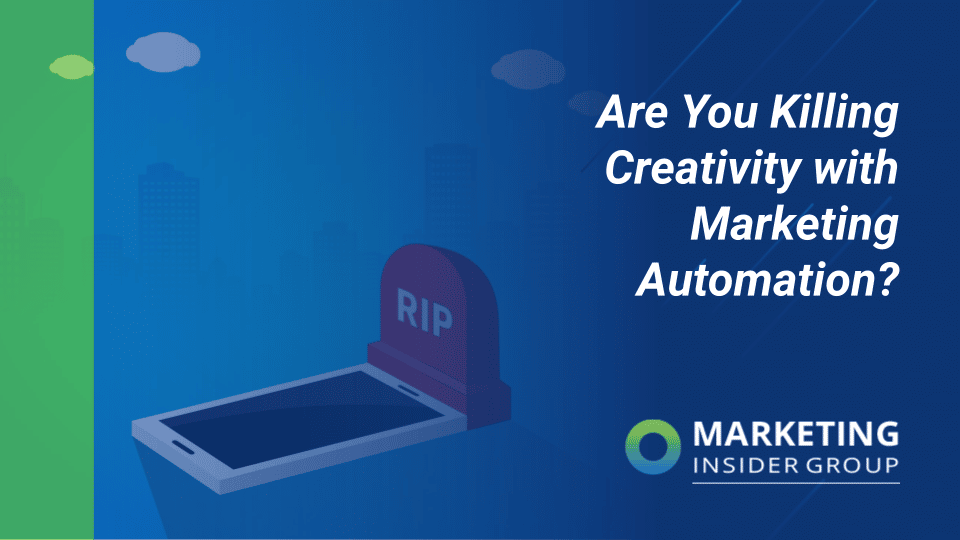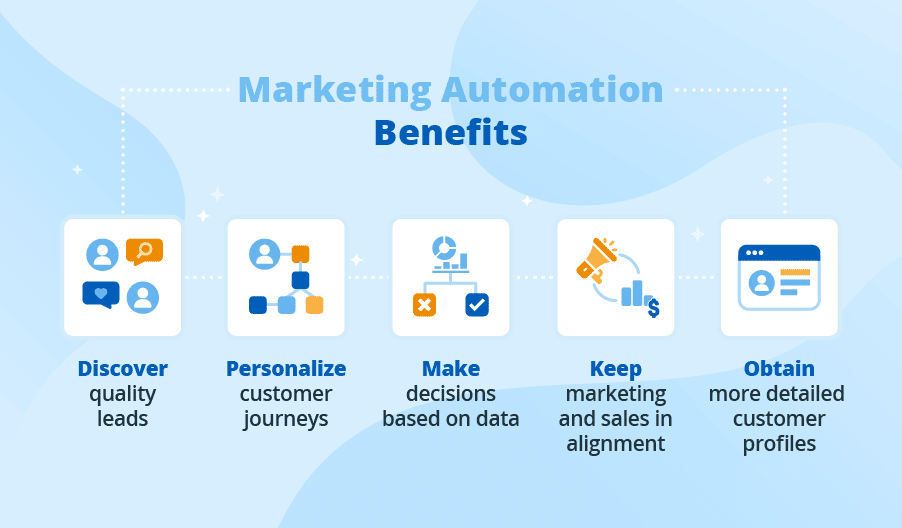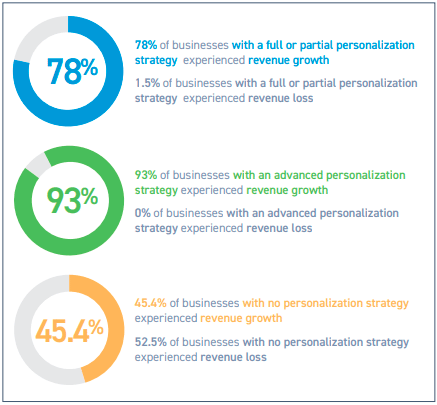
Marketing automation allows us to scale mundane tasks (*cough* sending emails *cough*) so we can reach a much larger audience more efficiently. Marketers can distribute information, content and responses more quickly and easily than ever before.
With all the modern tools available to marketers, one can’t help but ask – is marketing automation killing creativity? What does creativity in marketing even mean anymore? Considering all the marketing tactics, trends and data there are at our fingertips, it’s hard to figure out how to break through the noise creatively.
Automation systems facilitate sending templated messages on a large scale. Which means marketers run the risk of using generic communications that aren’t personalized.
If marketing automation tools are not utilized properly, not only can they kill the creative process, but they can result in mediocre and ineffective marketing campaigns.
If they’re implemented effectively, you stand to gain a ton of great information. Add creativity to the mix and you’ll be swimming in new leads!

Image Source: Science Soft
Let’s dive into what creativity in marketing really entails and how it can effectively be applied using automation tools.
Key takeaways:
- When trying to market creatively, remember not to lose sight of your brand and audience needs.
- Personalize your automated messaging; don’t just trust the over-used templates platforms offer. Make them your own!
- Test, test, test! There’s no way to know which creative avenue will work for your company if you don’t try them out.
How to Keep Things Creative in Marketing
Before we focus on creativity in automation, let’s establish some ground rules. Creativity in marketing is very different than in your high school art class; something as simple as designing a fun image to put in your email heading won’t get you anywhere. There are some general practices to keep in mind that will help improve your success.
Know your brand
So, you’re ready to start brainstorming. It’s important you don’t lose sight of your brand, its values, goals and purpose. Sure, you can come up with a fun slogan or CTA, but they’re worth nothing if they don’t convey your company’s purpose.
For example, here at MIG, a content marketing agency, we have no business going around claiming we’re the “miracle company that makes your life last longer!” just because we reduce your daily stress levels through managing your content marketing strategy. That’s way too big of a jump! (Even if we believe it a little bit.)
Instead, we find creative ways to convey what we really do! Every subject line in our email nurture series looks different and hits on a different pain point. Sometimes the subject has emojis, sometimes it’s a pun. Anything goes, but we always relate it to our company’s purpose. Here are a few examples:
- Tired of creating content? Save time (and Advil) in 2022!
- Build a team of champions…
- Start creating content that converts / Exclusive offer
- 18x ROI from just 0.1% of the marketing budget
Each of these conveys what we do in just a few words. No tricks and no click bait with empty promises.
Know your audience
One of the most important facets in marketing post-pandemic is connection and content personalization. In an oversaturated online atmosphere, consumers could care less about companies that don’t care about them. The proof is in the numbers.

Image Source: MIG
There’s no use in sending a creative email if it doesn’t resonate with your audience. Nearly 85% of all emails sent daily end up in spam, and you do not want yours to join them.
Make sure the information you’re relaying is relevant to your customers perspective and pain points. Think back to our examples above. Most of our email subjects emphasize that our customers can save money and see results when they hire us. If that’s not the two things a business owner wants most, I don’t know what is!
How To Apply Creativity to Automation
Before we dive into creativity in automation, brush up on the basics of marketing automation with this summary from Act!
Personalize your message
According to WP Engine, personalized content performs 42% better than generic content. This is where marketing automation tools come in handy. They provide data you can use to personalize messages and make it easy for you to segment your target audience and buyers.
Personalization is more than just placing the first name of your subscriber in the headline or body of an email. It’s about creating content that specifically addresses your unique buying persona’s issues, problems, and challenges, and providing them solutions for their particular situations.
One easy way that we accomplish this at Marketing Insider Group is by sending out our newsletter every day in which we feature our most recently published blog post. Through our own content marketing strategy, we cover a myriad of consumer pain points. From big picture industry news and trends to educational SEO tips, to pain point solutions, our blog covers all things content marketing.
Supervise your marketing automation
Some marketers leave it all up to their tools to do the work for them. Be the supervisor and boss of your automation tool. Tell your machine what to do, and don’t let it dictate your next action. Think of your automation tool as an employee that you need to micromanage.
Don’t fall into the path of least resistance, but feel free to delegate menial tasks to the tool, so you can focus on coming up with compelling marketing missives. Work hard on creating campaigns that capture the attention, emotion, and interests of your target audience.
Test and analyze
Apart from shaving precious hours off of your daily marketing tasks, automation tools also provide you with much-needed data and key performance metrics. This information is crucial in creating and developing the best strategies that work for your specific industry or niche.
Some may argue that marketing focuses too much on numbers and metrics instead of the creative force behind a successful marketing campaign. However, by testing and analyzing, you get to quantify and qualify success.
View these tools as a resource and use your data to understand your audience, but don’t forget to listen to what they’re saying. Comments and responses on your social media and blog posts indicate how well your content is performing. Heed suggestions and recommendations from your potential customers, as well as from past and current clients. Use a prospect’s unique information as a reference point in future communications.
Data from marketing automation platforms is just the tip of the iceberg. Remember that behind all of this data are real people who matter.
The next step is to test your content to determine which strategies work, and which don’t. Conduct A/B testing and watch the results closely. However, make sure that you don’t get bogged down. Use this data so you can constantly reinvent your strategies and find the one that works the best for your brand.
You want your communications to always be relevant. Don’t fall into the trap of creating messages once and never updating them. Habits change. Interests change. People change. Keep your automation tools updated, so you’re always delivering the “right” message.
Tweak built-in templates
Automation tools such as email marketing platforms provide templates that you can use to optimize your email design. Some marketers rely heavily on the templates provided.
If you’re pressed for time and need to use these templates, then, by all means, use them. The primary function of these tools is to save time, and time is important to us all.
Having said that, you should always try to tweak templates to match your brand personality and target audience. Most of these templates can be easily edited. Utilize these templates, so you don’t have to invest too much time and effort on structure but be sure to incorporate your own design and context into every marketing campaign you launch.
Bottom Line
Marketing tools don’t think for us – so they really shouldn’t hinder creativity. They’re there to provide data from which we can base our strategies.
To avoid sounding like robots, most automation tools allow for the use of personalization tokens that alter the content to make it more relevant to particular individuals. Take advantage of this feature and let’s rid the world of emails that start with “Hi there” (cringe). Better yet, take advantage of the data automation tools provide and test out as many versions of your marketing as you want! This is the path to ultimate creativity.
If I were to leave you with a single piece of advice when it comes to marketing automation, I would say to keep things “human.” Remind your prospects that they’re speaking to a real person. Remove the “no reply” and let people respond directly to you. Also, injecting a bit of personality into your message never hurts, as long as you’re doing it gracefully and stay true to your company’s purpose.
Marketing will always need creative minds because no automation tool can ever replace human ingenuity. Analyze your processes to make sure you’re using automation in ways that help your company instead of hurting it over the long run.
Need help coming up with creative content to include in your automation strategy? Look no further! Check out our SEO blog writing services or schedule a free consultation today to see how we can help.
The post Are You Killing Creativity with Marketing Automation? appeared first on Marketing Insider Group.
Did you miss our previous article…
https://www.sydneysocialmediaservices.com/?p=2841

